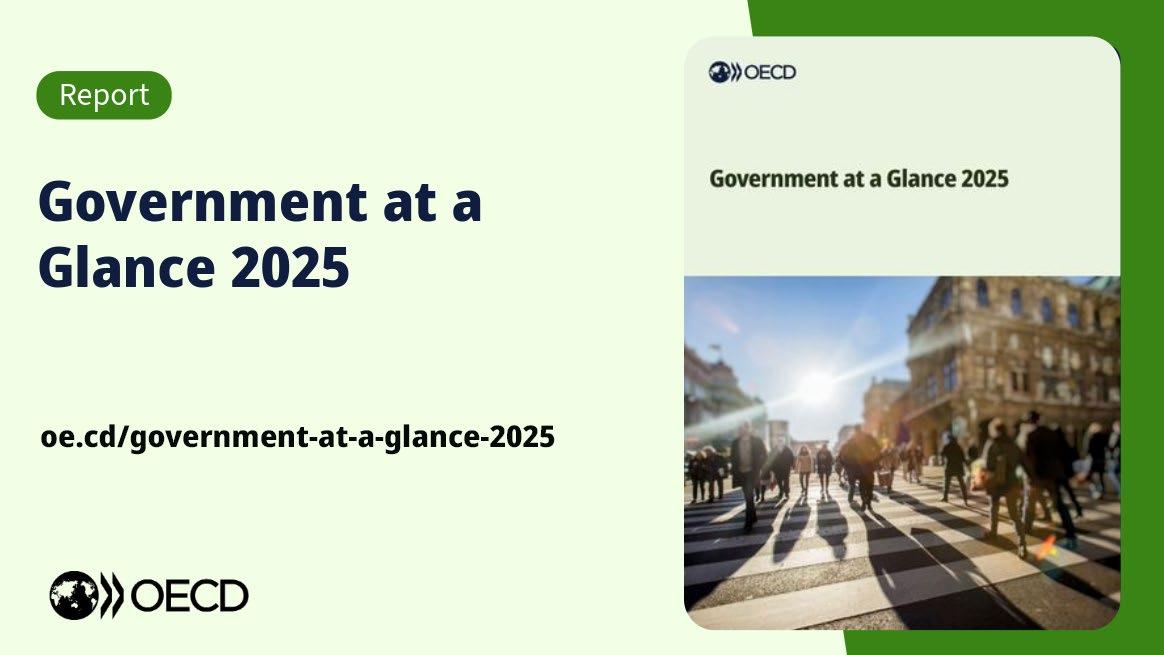OECD GOVERNMENT AT A GLANCE 2025

Elsa Pilichowski Director, OECD Public Governance
19 June 2025




Elsa Pilichowski Director, OECD Public Governance
19 June 2025


Governing for the Green Transition (focus chapter)
Governing for the green transition
Trust, satisfaction with public services and prosperity
Achieving results with good governance practices

Trust in national and local government, the national civil service, the judiciary, and parliament, 2023





Key policy issues facing OECD countries, 2023
Share of population who view policy issue as among the three most important ones facing their country










• Fiscal deficit is on average higher than pre COVID-19 levels and levels of taxation are considered high
• Regulatory tools are not fully adapted: Less than half of the population considers government can regulate new technologies appropriately
• While AI and digital tools are a big opportunity for productivity
Average deficit as a share of GDP, 2015-2019 %






41.4% of the population find it likely that government can regulate new technologies appropriately

• Most countries are carrying out annual spending reviews but much more can be done to increase efficiency and effectiveness of spending
• The quality of RIA systems for primary laws has improved but regulatory tools need upgrading
• The average score of DGI is 0.61, with most governments placed in the upper half of the index while AI is a big opportunity
Impact Assessment
primary laws, 2014-2024
Digital government index, 2023
















• Improve public voice and government responsiveness
• Make sure that institutions work for the general interest and increase accountability mechanisms
Share of the population that considers to have a say and that parliaments will hold government accountable, 2023


The political system allows people to have a say in what government does National parliament holds the national government accountable

43% expect the government to accept the demands of a corporation beneficial to their industry but harmful to society as a whole
of regulations on conflict of interest and their implementation



And provide services that are more people-centred
• Most countries (71%) have adopted an approach in service delivery focused on the major life events of citizens
• There is room to further deepen services integration
Services delivered using a life events approach, 2024

• There is room to enhance fair impartial and affordable access to justice
• Economic risk can be decreased by preserving a minimum standard of living
• Preserving the interests of future generations is an important driver of trust
Quality of civil justice, 2014 and 2024 0-1 (max)
Relative poverty rates before and after taxes and transfers, 2021
Before taxes and transfers
After taxes and transfers
% high or moderately high trust in national government Trust in the national government and confidence that it will consider the interests of future generations, 2023





























































% Confident that government balances interests of current and future generations

• Smarter, better enforceable, simpler and streamlined regulation will be key to productivity and growth
• Government’s efficiency matters: further can be done to enhance efficiency in public procurement
• More government datasets could be made available for wider use in the economy, also to support use of artificial intelligence
• Further compliance with lobbying standards is necessary to avoid policy capture by specific interests and enhance policy effectiveness and competition
Share of countries considering efficiency in their public procurement systems, 2023


Share of high value datasets available as open data, 2023
Lobbying standards fulfilled in regulation and in practice, 2023



• Most OECD countries have placed Net Zero Emissions targets in legislation
• Less than half of OECD countries have an Independent Climate Advisory Body Existence Independent Climate Advisory Body, 2023 Status of Net Zero targets
In Law In Proposed Legislation In Policy
Nb of OECD Countries
23 countries: AUS, AUT, CAN, CHL, COL, DNK, FIN, FRA, DEU, GRC, HUN, ISL, IRE, JPN, KOR, LUX, NZL, NOR, PRT, ESP, SWE, CHE, GBR
5 countries: ISR, LVA, SVK, SLV, TUR

3 countries: CRI, ITA, LTH
2 countries: EST, MEX

• Most OECD countries have green public procurement frameworks in place
• There is room for improving environmentally sustainable and climate-resilient infrastructure
on environmentally sustainable and climateresilient infrastructure,2022
(maximum) Green public procurement frameworks,2024





















• Environment is the most common issue in deliberative processes
• Ensuring representation of diverse groups is essential
Number of times a policy issue was addressed through a deliberative process, 2021-23





• Navigating the complex challenges ahead and mitigating associated risks will require strengthening trust in public institutions and fostering shared prosperity
Enhance a sense of dignity
Enhance a sense of security
Support growth in productivity

